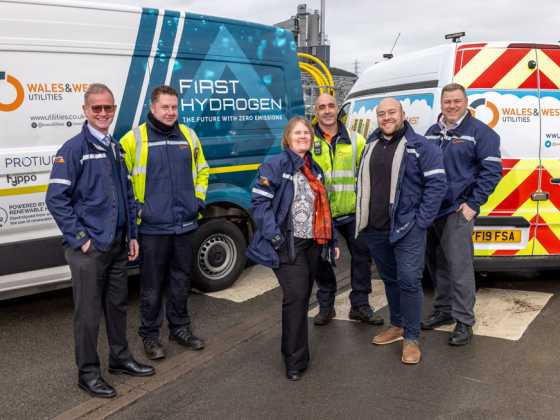Unlocking the benefits of transport data

The government’s newly published Transport Data Strategy sets out how the greater use of transport data will support further innovation in the sector, improve the way people and goods move, and help meet transport decarbonisation targets
The government has published its new Transport Data Strategy, which sets out plans for the greater use of data to support greater innovation in the sector and deliver better services.
It also shares how the better use of transport data can help progress the government’s transport decarbonisation efforts and the transition to zero emission mobility.
Better use of transport data use can improve interconnectivity between different types of transport, support the development of journey-planning apps and improve their accuracy, ultimately helping to make it easier for people to use and plan journeys, and for goods to get around.
The strategy set outs how the Department for Transport, by working with the transport sector, can improve the discoverability, quality and accessibility of transport data. It outlines where the department will make targeted interventions to support a healthy transport data ecosystem.
When launching the strategy, Transport Technology Minister Jesse Norman said: “Better use of transport data will help to improve journeys for travellers, tackle climate change and grow the economy.
“The Transport Data Strategy sets out the government’s vision in this area, creating the right framework for the market to innovate and transport users to benefit.”
Helping with decarbonisation
The strategy stresses that the use of data is essential to deliver innovative solutions to current societal challenges, such as climate change. It will allow for a better understanding of the impact of environment policies and transport behaviour. What’s more, opening data will allow for better interoperable systems for electric vehicle charging.
The Office for Zero Emission Vehicles is currently working with industry to make public chargepoint data openly available which will drive the growth of mobile apps that will enable drivers of Electric Vehicles (EVs) to plan their journeys and locate and access chargepoints with ease.
The same data will enable EV network operators to optimise their charging networks and provide government, public authorities and electricity network operators with the data they need to effectively plan for any future interventions, as well as investment required to grow and improve the UK’s charging network. The DfT also plans to incorporate EV charging availability into Mobility as a Service (MaaS), as well as standardised carbon data.
In March 2022, the Geospatial Commission launched a discovery research project to explore how location data can be better utilised to support planning and delivery of chargepoints by local authorities. The Commission will be publishing its findings, highlighting the opportunities for location data to boost delivery of chargepoint rollout. Good, timely data made available to the right people can help map demand for a given area, identify the most cost-effective locations and select which of these will best meet the needs of the community.
Five key ambitions
The Transport Data Strategy focuses on five key ambitions to improve the use of transport data. The first is to support data users to better share, find and access transport data, so that transport users benefit from it.
The second is to develop and promote the use of data standards in transport. The use of data standards should enable interoperability across modes of transport and with other systems such as energy and smart cities. The aim is to work to identify key data sets where data quality is a barrier to use – and explore solutions with data owners.
The strategy also aims to lead and promote a data driven culture across the transport sector by improving data literacy and providing targeted support to raise the skills base, as well as creating clear visions for the data programmes and services.
The strategy says that it will keep users and industry informed of progress, and will help provide leadership and support to help the transport sector ensure data is subject to appropriate governance, is protected, used for its lawful and ethical purposes, and at the same time its value is maximised.
Head of transport innovation at Transport for West Midlands (TfWM) Chris Lane commented on the strategy: “TfWM welcomes the Transport Data Strategies goal of greater quality and use of transport data. We want to see Journeys for Everyone becoming so convenient, seamless, and trusted, that users will often give up driving their personal vehicles, not because they have to, but because the alternative is better for them and the environment.
“A critical factor in achieving this is the customer receiving appropriate, accurate and timely information and having trust in the provider as they make their travel decisions.”
Find Transport Data pilot
As part of the strategy, the government is launching the ‘Find Transport Data’ pilot, a data catalogue to make it easier for innovators, researchers and others to find transport data, and ultimately deliver efficiencies and help improve services for customers.
This project will build the authoritative source for finding transport data. By bringing a range of private and third sector partners on board to create a data catalogue which will grow over time, this in turn will potentially generate a marketplace for transport data and help clarify the value of different data sets which may help with prioritisation of investment to improve quality and access of crucial datasets. Find Transport Data will provide a marketplace for transport data, so users can find the providers/publishers of data in one place, therefore, making innovation easier.
Tools to get started
Along with the strategy, the government will publish a number of data sets and tools to help kickstart better data use in the sector. This includes Local Authority Transport Data Guidance, which is a web-based tool to help councils use and share their transport data.
The guidance provides advice and case studies on opening up and sharing transport data, explaining why and how this should be done so that data can be used by others.
NaPTAN (National Public Transport Access Node) Discovery explores how the existing NaPTAN data set could be improved, such as the inclusion of accessibility data. NaPTAN is a dataset that details all the bus stops and rail stations in the country.
The government will also publish work from an HMT Economic Data Innovation Fund project with the urban observatories in Birmingham, Manchester and Newcastle on cataloguing, opening and visualising the transport-related data from their sensor networks.
What’s more, the DfT will publish a process evaluation report, detailing the evaluation of some of DfT’s data projects and assistance provided to other public bodies in designing and implementing their data projects.






